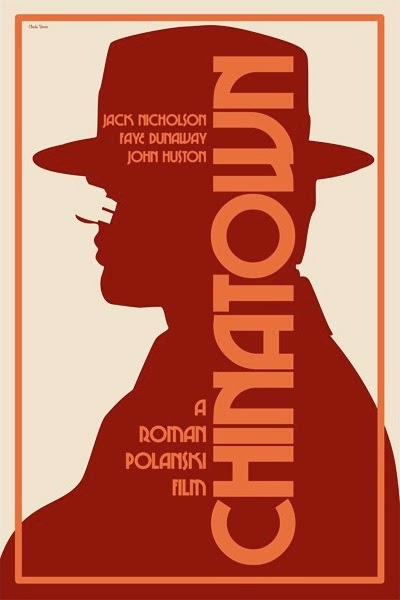Forget it, Jake, it's Chinatown.
Film noir is defined as a style or genre of cinematographic
film marked by a mood of pessimism, fatalism, and menace and usually uses dark
shadows and lighting to show the complicated moral nature of the subject. This
genre of film usually describes detective films of the 30s and 40s. One of the
most recognizable film noir movies is The
Maltese Falcon (#31 on the AFI
list) starring Humphrey Bogart. Even
though Falcon may be the most
recognizable film noir, there is one movie that received a higher rank on AFI’s
Top 100 list; Roman Polanski’s Chinatown.
Jake Gittes (Jack
Nicholson The Shining) is a Los
Angeles private detective that specializes in surveying cheating spouses. So
when a woman claiming to be Mrs. Evelyn Cross Mulwray hires Gittes to following
her husband Hollis I. Mulwray (Darrell
Zwerling Grease), Gittes takes
the job with no hesitation. However, Gettis’ life becomes complicated when the
real Mrs. Mulwray (Faye Dunaway Bonnie and Clyde) charges him of
invading her and her husband’s privacy. But when Hollis is found murdered, Mrs.
Mulwray drops the charges and hires Gettis to find out who and why her husband
was killed. What Gettis doesn’t realize yet that the "who" and "why"
is not so simple. To figure solve this murder, Gettis must navigate his way
through the seedy side of L.A. politics before he gets himself or Mrs. Mulwray
in the same morgue as Hollis Mulwray.
 Chinatown is a
very intriguing and thrilling film noir. Covered in mystery and political
scheming, this film is well deserved of being on the AFI list. Though, I must
say that I am not sure that it should be so high or even higher than The Maltese Falcon. I personally think
that these films should actually switch places on this list. If you carefully
view Chinatown, you can see some of
the same elements that made Falcon
such a good detective story.
Chinatown is a
very intriguing and thrilling film noir. Covered in mystery and political
scheming, this film is well deserved of being on the AFI list. Though, I must
say that I am not sure that it should be so high or even higher than The Maltese Falcon. I personally think
that these films should actually switch places on this list. If you carefully
view Chinatown, you can see some of
the same elements that made Falcon
such a good detective story.
In one of his most famous roles, Jack Nicholson portrays the
arrogant P.I. very well. When we first meet Gettis, he is full of himself and
takes pride in the things we uncovers. As the film progresses thought,
Nicholson does an amazing transformation of Gettis. Gettis becomes less sure of
himself and more mindful of a bigger world around him. Faye Dunaway gives the
audience a very cold Evelyn. Through most of the film, Evelyn is very guarded
and aloof. This may sound like a bad thing, but on the contrary, Dunaway is
brilliant at this and by projecting this personality she is able to create a
very intriguing character.
 Roman Polanski (The
Pianist) gives us a brutal look into 1930s Los Angeles and how politicians
tried to refine the city. Polanski fiercely shrouds a lot of this film in shadow,
both figuratively and realistically. The
director uses the lighting of the film to give the sense looming trouble and is
also able to create a ‘shadow’ around everyone around Gettis. I equally enjoyed
Polanski’s use of the camera angles, especially those of Nicholson and Danaway
together. At first the camera uses a medium shot to show the distance between
these two actors. As the story unfolds, the actors and the camera become closer
to show the closeness of Gettis and Evelyn.
Roman Polanski (The
Pianist) gives us a brutal look into 1930s Los Angeles and how politicians
tried to refine the city. Polanski fiercely shrouds a lot of this film in shadow,
both figuratively and realistically. The
director uses the lighting of the film to give the sense looming trouble and is
also able to create a ‘shadow’ around everyone around Gettis. I equally enjoyed
Polanski’s use of the camera angles, especially those of Nicholson and Danaway
together. At first the camera uses a medium shot to show the distance between
these two actors. As the story unfolds, the actors and the camera become closer
to show the closeness of Gettis and Evelyn.
Though as I have mentioned, I do think that Chinatown should be a little lower on
this list. However, I do still think that this in one of the best film noir
movies ever made. Nicholson’s performance alone makes this film so
unforgettable, though Polanski’s direction and unconventional ending make this
film legendary.
The Verdict:
Worth Your Time.

Comments
Post a Comment